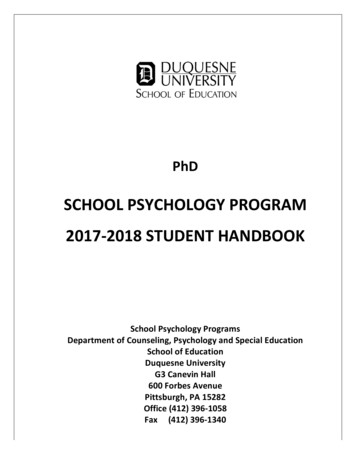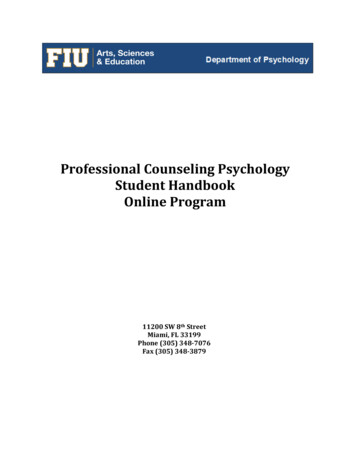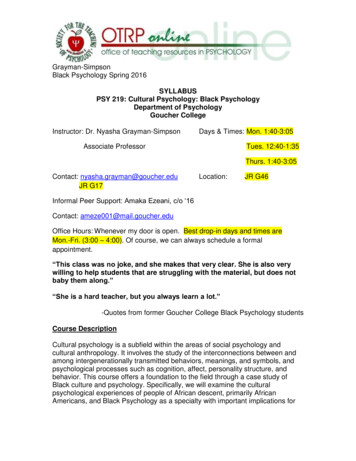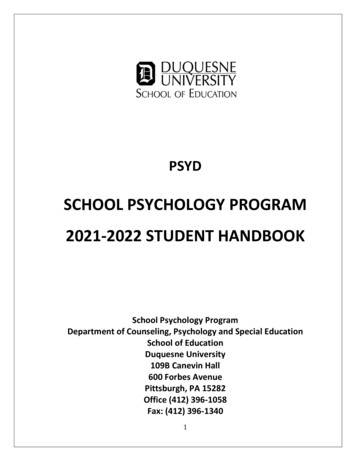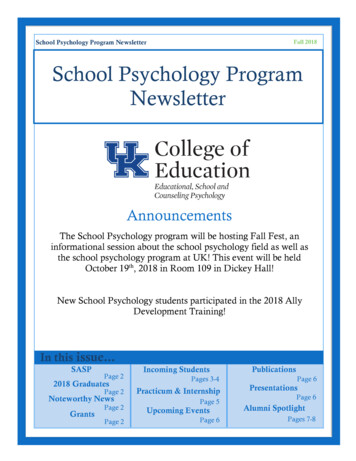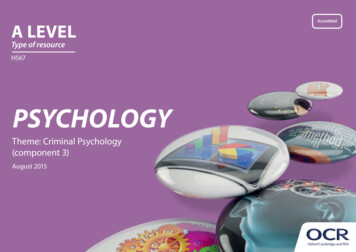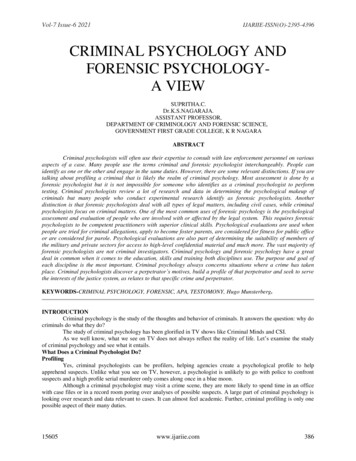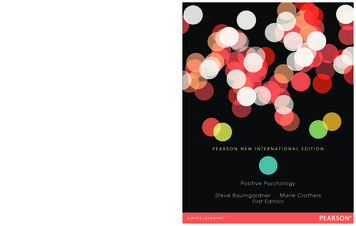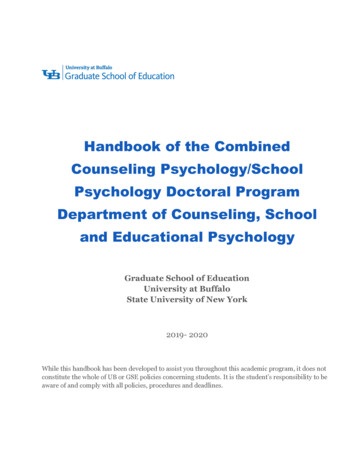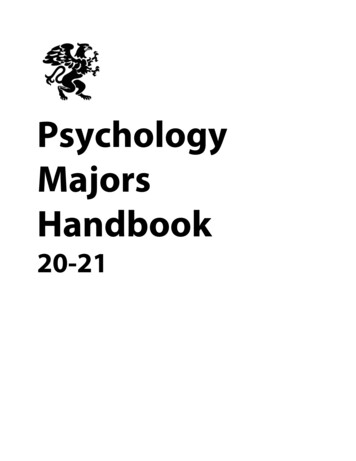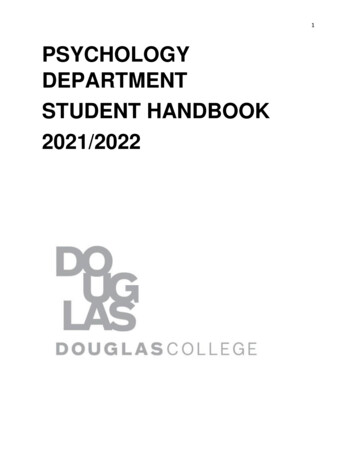
Transcription
1PSYCHOLOGYDEPARTMENTSTUDENT HANDBOOK2021/2022
2TABLE OF CONTENTSIMPORTANT.3WELCOME TO THE PSYCHOLOGY DEPARTMENT.4, 5Psychology Coordinators.6Psychology Faculty.7, 8Program Goals And Student Objectives.9Join the Psychology, Blackboard Communication Centre .10Frequently Asked Questions.11Scholarships and Bursaries.12Research Opportunities.13STUDYING PSYCHOLOGY.14Psychology Courses Offered.14, 15Psychology Lab.16Psychology Lab Technicians.17Douglas College Psychology Society.18, 19Resources For Writing Term Papers and Essays.20Policy on Academic Dishonesty and Student Conduct.21CREDENTIALS OFFERED.22Pathways in Psychology .23Associate Arts Degree in Psychology.24, 25Associate Arts Degree, Pre-Bachelor Psychology.26Minor in Psychology.27BA Degree in Applied Psychology Flowchart .28Bachelor of Arts in Applied Psychology . . 29, 30Applied Areas of Concentration:1 Applied Theory and Research . 312 Disability and Applied Behavior Analysis (DABA) .313 Forensic / Criminology . .314 Leadership and Management . .315 Pre-Counselling . 316 Psychosocial Rehabilitation (PSR) .31Bachelor of Arts in Applied Psychology – Honours . .32, 33Graduate Diploma in Psychosocial Rehabilitation.34CAREERS IN PSYCHOLOGY RELATED FIELDS.35, 36
3IMPORTANTThis document is accurate as of September 2021.While every effort is made to ensure that the information is kept up to date, changes may occurin the program that may not be immediately reflected in the Psychology Department Handbook.Students are encouraged to confirm information with an Enrolment Services Advisor bychecking the website: Contact Enrolment Services
4WELCOME to the PSYCHOLOGY DEPARTMENTPsychology strives to describe, predict, understand, and influence behavior and mentalprocesses. Psychology is divided into two areas: experimental (basic or applied research) andclinical/counselling (assessment and therapy). Psychological scientists use experiments, surveys,naturalistic observations, case studies, and clinical studies to develop theories and investigatethe nature of behavior, thought and emotion.Who are we?At Douglas College we have one of the largest academic departments, with over 25 full-timefaculty, all of whom hold doctoral degrees, and many of whom are registered clinicians orcounselors. Our faculty members have diverse expertise in areas that include:neuropsychologydevelopmental psychologycognitive psychologyforensic psychologysocial psychologycultural psychologyevolutionary psychologyabnormal psychologyclinical psychologycounselling psychologybiopsychologygender and intersectionalityhealth psychologyeducational psychologyorganizational psychologyWhat do we offer?Our department offers a 2-year Associate of Arts Degree, a 4-year Bachelor of Arts Degree inApplied Psychology, a 4-year Bachelor of Arts Honours Degree in Applied Psychology, a Minorin Psychology and a Post Graduate Diploma in Psychosocial Rehabilitation.The Bachelor of Arts Applied Psychology Degree was created to expose students to a variety ofoccupations where psychology is applied and to equip students with skills necessary to succeedin the workforce. The Bachelor of Arts Honours Degree has a higher GPA entrance requirement,but it supplements the Bachelor of Arts in Applied Psychology Degree, with additional training in
5psychology, and experience conducting self-directed research for those who may want to pursuegraduate school.In all cases the intention is to create lifelong, psychologically literate learners. A psychologicallyliterate graduate not only leaves with basic psychological knowledge but also:1) values, recognizes and understands diversity;2) solves problems with creativity and skepticism;3) is competent in the use of technology and accessing information;4) can apply psychological knowledge throughout his/her life, within organizations, and tohis/her communities;5) acts ethically;6) can communicate effectively to different audiences; and7) can reflect on his/her own and other’s behaviors to gain insights and affect change. 1Where are we located?We have two campuses, one in New Westminster and one in Coquitlam (David Lam Campus).While a majority of the upper-level courses are taught in New Westminster, several 1 st, 2nd and3rd year courses are taught in Coquitlam, and some are taught on-line.Visit us at Bachelor of Arts, Applied Psychology for further information.
6PSYCHOLOGY PROGRAM COORDINATORSKaryn Audet, BA, MA, PhD (SFU),Coordinator Service LearningContact and Research InformationRegina Casey, Dip OT (Dublin), MA (Royal Roads University, PhD (UBC),Coordinator Psychosocial RehabilitationContact and Research InformationNina Di Pietro, BSc (Concordia), PhD (Boston), Postdoc (UBC),Chair Psychology and Social SciencesContact and Research InformationJoseph Thompson, BA, MA, PhD Honours (SFU)Coordinator Pathways in PsychologyContact and Research InformationNicole Vittoz, BSc Hons (Michigan), PhD (Wisconsin), Postdoc (UBC),Coordinator BA Applied PsychologyContact and Research Information
7PSYCHOLOGY PROGRAM FACULTYNew Westminster faculty offices are in the 3400 area. Coquitlam faculty offices are in building B.Office hours and instructors’ teaching schedules are listed on their office doors or in your ep Atwal, BA (SFU), MA, PsyD (Pepperdine University)Contact and Research InformationJim Barton, BA (Wilfrid Laurier), BEd (Western Ontario), MSc, PhD (Alberta)Contact and Research InformationArnold Cera, BA (Manitoba), BEd (Brandon), MA (Saskatchewan), PhD (Wisconsin)Contact and Research InformationValerie Dare, BA (Carlton), MA, PhD (Concordia)Contact and Research InformationRaquel Faria Chapdelaine, BA (PUC, Brazil), MA, PhD (Saskatchewan)Contact and Research InformationSteve Charlton, BA (Brock), MA, PhD (SFU)Contact and Research InformationTeresa Howell, BSc, MA, PhD (UBC)Contact and Research InformationGabriella Ionita, BA, MA (SFU), PhD (McGill)Contact and Research InformationJeremy Jackson, BA Hons, MA, PhD (SFU)Contact and Research InformationMaria Janicki, BSc (Brock), MA, PhD (SFU)Contact and Research InformationBryan Jones, BA (UFV), MA, PhD (SFU)Contact and Research InformationAnne MacGregor, BA Hons (Carlton), MS (Peabody), EdD (UBC)Contact and Research InformationWilma Marshall, BEd, MEd, PhD (C Psyc) (Alberta)
8Contact and Research InformationStelian Medianu, BA (UBC), MSc, PhD, Postdoc (Western Ontario)Contact and Research InformationDonald Meen, BA, MEd (Alberta), PhD (Manitoba)Contact and Research InformationShelley Moore, BA (Windsor), MA (Laurentian), PhD (UBC)Contact and Research InformationBryan Nadeau, MA (Concordia), PhD (SFU)Contact and Research InformationKaren Parhar, BA Hons (British Columbia), MA, PhD (Saskatchewan)Contact and Research InformationDavid Prime, BA (SFU), MA, PhD (UBC)Contact and Research InformationStephen Rochefort, BA (Calgary), MA (SFU), PhD (SFU)Contact and Research InformationGraham Rodwell, BA (Cambridge), MA (Manchester), MBA (Open University), PhD(Manchester)Contact and Research InformationHajera Rostam, BSc (Toronto), MA, PhD (UBC)Contact and Research InformationJoachim Sehrbrock, BA (Naropa), MA, PhD (Sofia)Contact and Research InformationJoseph Thompson, BA (Hons), MA (SFU), PhD (SFU)Contact and Research InformationRoger Tweed, BA (SFU), MA, PhD (UBC)Contact and Research InformationKristin Wagner, BA (Buffalo), MA, PhD (Alliant International)Contact and Research InformationSteven Welch, BA, MA, PhD (Manitoba)Contact and Research InformationScott Wilson, BA, MS (Eastern Washington), PhD (UBC)Contact and Research Information
9PROGRAM GOALS AND STUDENT OBJECTIVESProgram Goals1. To produce “psychologically literate” citizens.2. Blend a solid academic foundation with a practical skills application;3. To promote breadth and cross-discipline integration of skills to enhance employability inthe workforce;4. Provide a flexible degree program that can be tailored and specialized to prepare for entryinto a variety of psychology-related careers;5. To expand the diversity of existing upper-level courses in psychology;6. Endow the capacity for professional, independent intellectual work;7. To prepare students to design, implement, and report organizational research;8. To offer the necessary prerequisites for students who wish to pursue graduate work ineducation or counselling psychology.9. To provide laddering opportunities with the Disability and Applied Behavior Analysis(DABA) program;10. To prepare students to write the Certified Psychiatric Rehabilitation Practitioners (CPRP)exam.11. To prepare students to apply for graduate work in psychology or other professionalprograms through the BA Applied Psychology Honours program;12. To integrate students’ application of psychological and criminological theory and practice;13. Collaborate with community organizations in order to provide enriched learningopportunities for our students;14. Promote the life-long learner perspective; and15. Espouse the Douglas College Mission Statement, Goals and Values 2Student ObjectivesDevelop and hone core competencies and requisite knowledge for work in psychology, including:1. Write effectively in modes and formats required within psychology;2. Read, comprehend and use written materials including numerical data, academic papers,and psychological tests and measures.3. Speak with clarity, proficiency, and confidence;4. Think critically and creatively;5. Recognize and respect diversity and individual difference;6. Discern ethical consequences of decisions and actions;7. Develop and practice skills such as interviewing, problem solving, ethical decision making,and information seeking and sequencing;8. Recognize and manage change positively;9. Employ quantitative and qualitative analysis to solve problems;10. Transform information into judgment and action; and11. Identify, prepare for, and pursue career pathways in psychology-related fields.
10JOIN THE BLACKBOARD COMMUNITY PAGE!Please take a moment to join the Psychology Communication Centre, which is partof our Blackboard Community page. Within this community, you will be able to: Communicate with faculty and other students.Keep current about announcements, events, workshops, volunteer, and jobopportunities.Discuss related topics.Join groups you may be interested in.Complete fillable internal application forms (BA Honours Program).Complete program checklists and concentration declaration forms.Find information about graduate school applications and planning tools.To join the Psychology Blackboard Community, please follow these steps:1. From the main Douglas College website choose “LOGINS” and scroll downTo “BLACKBOARD COMMUNITY”.2. Enter your student information (your login) where it says “LOGIN HERE”3. On the left select Institution Page.4. Scroll down to “HSS Communication Centres” and click on Psychology.5. You will now be on our Psychology BLACKBOARD COMMUNICATION CENTRE and cansign up and view all the resources on the site Psychology Communication Centre.Here is a video on how to find your Blackboard courses.The Centre for Educational and Information Technology has created a Getting Started withBlackboard, Student Resources page HERE which offers a list of things “TO DO” before classesbegin, provides quick links to IT information and Blackboard FAQ’s.
11FREQUENTLY ASKED QUESTIONSFor Psychology Program FAQs, Click here.If you have further questions please contact us:Psychology Program Contacts
12SCHOLARSHIPS AND BURSARIESThere are several scholarship and bursary awards available for psychology students to apply for.The following are examples of the financial awards and some of the selection criteria information.Please contact the Financial Aid Office for more detailed information on eligibility requirementsand deadlines for applications here: Awards, Bursaries and ScholarshipsAmanda Todd Legacy Award of DistinctionCarol Todd established this award in December 2015 to pay tribute to, and honour, herdaughter Amanda Todd who has been described as "a transformative angel". Amanda died bysuicide at the age of 15 in October 2012. Eligible recipients must be enrolled in any programthat focuses on mental health. This includes, but is not limited to, programs within the Faculty ofChild, Family and Community Studies, the Faculty of Health Sciences and the Faculty ofHumanities & Social Sciences: List of Awards, Bursaries, ScholarshipsCaroline Chan Memorial BursaryThe Frank Wing Memorial Bursary was established by Caroline and Adrienne Chan, in 1989, tohonour their uncle, Frank Wing. The bursary was created to support students in need who areenrolled in programs relating to social services and social sciences at Douglas College withpreference given to students of Aboriginal, Asian or South Asian descent. In 2013, CarolineChan passed away and the bursary was renamed in her memory: Caroline Chan MemorialEndowment BursaryBrodie Osborne-Campbell Memorial ScholarshipThis endowment fund was established in 2007 to honour the life of Brodie Osborne-Campbell, a15-year-old Grade 10 student at Charles Best Secondary in Coquitlam, who passed away of abacterial meningitis infection. Brodie was the beloved son, and only child, of Colin Campbell, aninstructor in the Douglas College Criminology Department, and Judith Osborne. The purpose ofthis fund is to recognize the academic achievements of students enrolled in Criminology atDouglas College: Brodie Osborne-Campbell Memorial ScholarshipJack Ferguson Memorial ScholarshipThis fund was created by the Douglas College Criminology Department and the friends andfamily of Jack Ferguson in memory of Jack, a long time faculty member who was instrumental inestablishing the Criminology program at the College. The recipient is preferably a Criminologystudent: Jack Ferguson Memorial ScholarshipArlene Clay Memorial BursaryIn 2012, Douglas College Foundation hosted the first ever Bursary Draw at A Class Act.Proceeds from the tickets sold, plus a generous donation from winning guest Mike Clay, wentdirectly to students in need. Mike named the bursary in memory of his mother, Arlene Clay, aretired School District 43 teacher, who initiated what became a district-wide public speakingprogram. The Arlene Clay Memorial Bursary provides support to Port Moody residents with apreference to those enrolled in the Future Teachers – Associate of Arts Degree program orEarly Childhood Education programs (diploma & certificate) at Douglas College: Arlene ClayMemorial Bursary
13RESEARCH OPPORTUNITIESThere are several opportunities for students to get involved with research at Douglas College,including: conducting your own research projects within classes or as an honours thesis,volunteering as a research assistant or as a research participant. Students producingoutstanding research often present their work at one of our local undergraduate researchconferences. Feel free to ask your instructors about ongoing research they might be involved in.Douglas College Student Research Day: students from across the college showcase theirresearch to the Douglas College community.Connecting Minds: undergraduate research conference hosted annually by KwantlenPolytechnic University: Connecting Minds 2022Studying PSYCHOLOGYThe psychology program offers a wide range of courses. Not all courses are offered eachsemester, and the number of course sections offered each semester is limited. Studentsmay complete psychology courses on a part-time or full-time basis providing the specific courseprerequisites are met. Most courses with 2000, 3000 and 4000 numbers have a prerequisite (theyrequire that you have taken a previous course).It is important to remember that there is a high demand for psychology classes and studentsshould anticipate this when they register for classes. Also, if psychology classes are full, studentsshould attempt to register in other university transfer course requirements for the Associate ofArts (Psychology), BA in Applied Psychology, or the Douglas/TRU-OL Psychology degree.
14STUDYING PSYCHOLOGYStudents may complete Psychology courses on a part-time or full-time basis providing thespecific course prerequisites are met. If Psychology classes are full, students should attempt toregister in other university transfer course requirements for their specific credential. All 2000,3000 and 4000 courses have a prerequisite. Please note not all courses are offered eachsemester, and the number of course selections offered each semester is limited.PSYCHOLOGY COURSES OFFEREDPSYC 1100 An Introduction to Psychology IPSYC 1110 Psychology of WomenPSYC 1130 Lifespan Human DevelopmentPSYC 1200 An Introduction to Psychology IIPSYC 2150 Academic and Professional Development in PsychologyPSYC 2207 An Introduction to Educational PsychologyPSYC 2300 Data Analysis in PsychologyPSYC 2301 Research Methods in PsychologyPSYC 2315 Biological Bases of BehaviorPSYC 2341 Abnormal PsychologyPSYC 2360 Cognitive PsychologyPSYC 2901 Special Topics in PsychologyPSYC 3120 Gender RelationsPSYC 3300 Applied Intermediate Research Methods & Data AnalysisPSYC 3301 Applied Data Analysis in PsychologyPSYC 3304 Health PsychologyPSYC 3308 History & Philosophy of Modern PsychologyPSYC 3309 Critical Issues in PsychologyPSYC 3314 Psychology & LawPSYC 3315 Human NeuropsychologyPSYC 3320 Child Behaviour and DevelopmentPSYC 3321 Developmental Psychology: Adolescence and Emerging AdulthoodPSYC 3322 Developmental Psychology: Adulthood & AgingPSYC 3330 An Introduction to Social Psychology
15PSYC 3331 Introduction to PersonalityPSYC 3333 Cultural Competency and Counselling with Canada’s Indigenous PeoplesPSYC 3340 Cultural PsychologyPSYC 3341 Drugs and BehaviourPSYC 3342 Developmental PsychopathologyPSYC 3361 Social CognitionPSYC 3365 The Psychology of LearningPSYC 3370 The Psychology of MemoryPSYC 3375 Theories of Counselling & PsychotherapyPSYC 3385 Evolutionary PsychologyPSYC 3390 Applications of Psychological Knowledge (Service Learning & Research)PSYC 3901 Special Topics in Applied Psychology / Social SciencesPSYC 3902 Special Topics in Biological PsychologyPSYC 3903 Special Topics in Clinical / Counselling PsychologyPSYC 3904 Special Topics in Cognitive PsychologyPSYC 3905 Special Topics in Developmental PsychologyPSYC 3906 Special Topics in Psychology / Social SciencesPSYC 4360 Psychological AssessmentPSYC 4370 Counselling Skills FundamentalsPSYC 4371 Group Counselling: Theory and PracticePSYC 4373 Vocational Assessment and CounsellingPSYC 4375 Clinical PsychologyPSYC 4390 Honours SeminarPSYC 4400 Honours Thesis IPSYC 4410 Honours Thesis IIPSYC 5001 Mental Health Services & Systems: History and TrendsPSYC 5002 Psychosocial Rehabilitation & RecoveryPSYC 5003 Psychosocial Rehabilitation Practitioner CompetenciesPSYC 5004 Psychosocial Rehabilitation: Best & Promising PracticesPSYC 5005 Seminar & Practicum in Psychosocial Rehabilitation
16PSYCHOLOGY LABORATORYThe Psychology Department has Laboratories at both our New Westminster and David LamCampus. These rooms are used for:Laboratory Demonstrations: Many classes offer hands-on and fun ways to learn aboutpsychology topics.Computer Use: Computers are available for students to use for psychology coursework.Experiments: The lab technicians are available to help when you choose participants, collectyour data, analyze, interpret and write up your results. You are also welcome to borrowtheequipment you need to run your experiments from the lab.Research Papers & Assignments: The lab assistants can help you with information about APAwriting style and using library resources to find articles.Tutoring: If you have questions concerning any of the topics covered in psychology, please dropby the lab to receive extra help on the concepts in question. Please be advised that the lab is nota substitute for reading the textbook or attending class.
17PSYCHOLOGY PROGRAM LAB TECHNICIANSGerry Gramozis, BA (Double Major) (Trinity Western), Dip. Addiction Medicine (UBC), Cert.Addiction Care and Treatment (UBC), Cert. Substance Use and Addiction Nursing (UBC), Cert.Substance Use (JIBC), Ex. Cert. Addiction Studies (Mount Royal)Tel: 604-777-6157 (Coquitlam Campus)Email: gramozisg@douglascollege.caMelissa Mack, BSc (Alberta)Tel: 604-527-5631 (New Westminster Campus)Email: mackm@douglascollege.caBert Sager, MA (SFU)Tel: 604-527-5508 (New Westminster Campus)Email: sagerb@douglascollege.caHailea Williams, BA (Hons) (Douglas College), CRLA ITTPC Master Certified Tutor, Level 111(Douglas College)Tel: 604-527-5508 (New Westminster Campus)Email: hwilli22@douglascollege.caContacting the Psychology LabStudents wishing to contact the Psychology Lab with questions regarding their assignments andcoursework should email psychlab@douglascollege.ca. In the subject heading of your emailmessage, indicate the name of your course along with the name of your instructor - this is neededto help ensure a proper reply.For additional information about the Psychology Laboratory visit our website: PsychologyLaboratory
18DOUGLAS COLLEGE PSYCHOLOGY SOCIETYStudents, professors, and alumni interested in sharing, mentoring, raising awareness, andbuilding a community around the field of Psychology at Douglas College.Learn more and visit our website: The Psychology SocietyLike us on Facebook: https://www.facebook.com/DCpsychsociety/Follow us on Instagram: https://www.instagram.com/dcpsychsociety/Follow us on Twitter: https://twitter.com/DCPsychSocietyThe Douglas College Psychology Society is a faculty-sponsored group of Douglas Collegestudents who share a common interest in psychology. The Psych Society meets regularly to plan
19events such as "meet and greets" and information nights about careers in psychology.Occasionally, they get together and just talk about cool psychology related topics. They areprimarily self-funded, raising money through various means: perhaps you've seen them sellingtasty baked goods on campus. Current students involved in this association have showninitiative, teamwork and collaborative skills while organizing fundraisers, social events, specialtopic lectures, as well as faculty seminars for students.The Psychology Society is open to all students with an interest in the field. Whether you are a firstyear or fourth year, psych major or general studies, if you want to get involved, feel free to contactus or show up to a meeting.Some of the past DC Psychology Society events have been: Movie nights (including Q & A sessions with Faculty or special guests).Meet and greet nights (Faculty and Guest Speakers present and answer questions aboutwhat you can do with a psychology degree).Volunteering at Depression Screening Day.
20RESOURCES FOR WRITING TERM PAPERS AND ESSAYSAs a student, you will be required to write research papers and/or essays. This learning objectiveis essential to develop research, organizational and communication skills. Some importantpreliminary steps include planning and gathering information for the assignment. Make sure thatyou fully understand the assignment and the instructors' expectations. Ask for clarification, whenneeded to ensure you are confident you know what the assignment entails.The library offers many valuable services for students, including writing help and online tutoring.There are also numerous guides and online tutorials for study skills and grammar skills. Forinformation on the Learning Centre and its writing services please see:The Learning Centre, Writing ResourcesResearching Your Paper and Choosing the Right SourcesMany of your papers in post-secondary education will require you to research a topic and presentother authors’ work. In addition to ensuring you know how to cite the research you refer to in yourpaper, you also need to know what sources are reliable and which are not. In general, most formalresearch essays will require references to academic, peer-reviewed journal articles andscholarly works. The reason behind this distinction is research that is published in a peer-reviewedjournal has gone through a rigorous review process by several academics in the specific field ofstudy. When done properly this process helps ensure that the research that is published is freeof major flaws. Other publications, most notably websites such as Wikipedia, often will containinformation that may be biased, incomplete, or based on conjecture, stereotypes or incorrectassumptions. Always consult with your instructor as to what type of research she/he requires foran assignment, and if you are ever in doubt as to the reliability of a particular piece of work, askthat instructor or the librarian.Citing Your Research SourcesMost assignments will require you to cite your sources when referencing authors’ ideas, even ifyou paraphrase. You will need to become comfortable with the correct ways to cite your researchwithin your assignments. Our psychology department uses the style and citation guide publishedby the American Psychological Association (APA Style).Please use the Douglas College Psychology Department’s An Introduction to APA Style.Our Douglas College librarians are extremely knowledgeable about the proper use of citationsand are there to help should you need some guidance.
21PSYCHOLOGY DEPARTMENT POLICY ON ACADEMIC INTEGRITYAND STANDARDS OF STUDENT CONDUCTDouglas College, Psychology Department considers cheating on exams, plagiarism, andsubmission of the work of others as one’s own, as serious violations of Douglas College policy.Please see the following link for information on the Douglas College’s Academic Integrity Policy.Plagiarism avoidance guides can be found on the library and learning centre website:Plagiarism: How to avoid itThere is also this Douglas College Plagiarism TutorialFor more information, please visit the following links:Academic Integrity Resources for StudentsAcademic Integrity PolicyStandards of Student ConductIf you have further questions please contact us:Psychology Program Contacts
22CREDENTIALS OFFERED1.2.3.4.5.6.Associate of Arts Degree, Psychology [60 credits]Associate of Arts Degree, Pre-Bachelors Psychology [60 credits]Minor in Psychology [30 credits]Bachelor of Arts, Applied Psychology [120 credits]Bachelor of Arts, Applied Psychology - Honours [120 credits]Psychosocial Rehabilitation Graduate Diploma [15 credits]All Psychology courses are university transferable. For information on individual course transferto specific BC Provincial Universities, please see the BC Transfer GuideTo receive your credential, you must fill out an application to graduate.Application forms are available at Enrolment Services or apply online:Graduation Application
23PATHWAYS IN PSYCHOLOGY
24ASSOCIATE OF ARTS DEGREE – PSYCHOLOGYAn Associate of Arts (AA) degree is a combination of 60 credits which include: English,Humanities, Social Sciences, and Lab Science/Math/Science courses.The Associate of Arts Degree specializing in Psychology is a two-year (60 credits) credentialdesigned to ensure students can transition into the Douglas College Bachelor of Arts in AppliedPsychology, Bachelor of Arts in Applied Psychology – Honours, or to transfer into the third yearof any BC post-secondary institution BA in Psychology.The following information is from the Douglas College website Psychology, Associate of ArtsRequirements: Successful completion of 60 University Transfer (UT) credits as listed belowA minimum cumulative GPA of 2.00 (average overall grade of C)All courses must be University Transferable to at least one of the Research Universities(SFU, UBC, UBCO, UNBC, UVIC) - accord
Regina Casey, Dip OT (Dublin), MA (Royal Roads University, PhD (UBC), Coordinator Psychosocial Rehabilitation Contact and Research Information Nina Di Pietro, BSc (Concordia), PhD (Boston), Postdoc (UBC), Chair Psychology and Social Sciences Contact and Research Information Joseph Thompson, BA, MA, PhD Honours (SFU)
